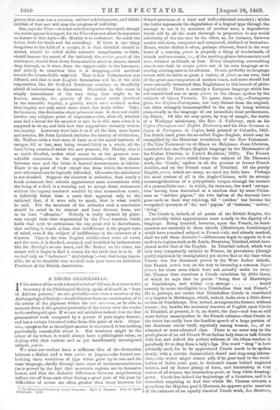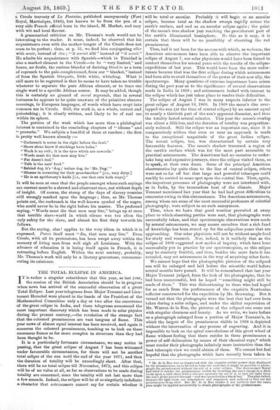A NEGRO GRAMMARIAN.
"1" F the writer of the work referred to below*did not, in a letter to the
Secretary of the Philological Society, speak of himself as "born of African parents," no one probably—not even a member of the Anthropological Society—would discover from an examination of it the colour of the pigment within his rete MUCOSUIll, or be able to measure from it the greater proximity of the writer over the reader to the anthropoid apes. If we are not mistaken indeed, it is the first grammatical work composed by a person of pure negro descent, and has a certain historical value from this point of view. Other- wise, except so far as its subject-matter is concerned, it has nothing particularly remarkable about it. But whatever might be the colour of its writer, it would always have a philological value, as dealing with that curious and as yet insufficiently investigated subject, patois.
We trust our readers have a sufficient idea of the distinction between a dialect and a true patois or jargon,:---the former em- bodying those variations of type which grow up in one and the same language, chiefly through mere want of intercommunication (as is proved by the fact that mountain regions are its favourite homes, and that the dialectic differences between neighbouring valleys cut off from each other during a great part of the year by difficulties of access are often greater than those between far
* The Theory and Practice of Creole Grammar. By J. J. Thomas. Port of Spain (Trinidad). 1569.
distant provinces of a level and well-cultivated country) ; whilst the latter represents the degradation of a lingual type through the attempt to use it by members of another race, a degradation which will be all the more thorough in proportion to any social inferiority of the one race to the other, as, for instance, between master and slave, conqueror and conquered, civilized or barbarian.
Hence, whilst dialect is often, perhaps oftenest, found in the very heart of a country, patois is properly a thing of borderlands, of islands and sea-coasts, i.e., of the meeting-places between race and race, whether as friends or foes. Every conquering, encroaching race is sure both to create patois out of its own language or to overlap existing ones in its advance. Hence, probably no language covers with its skirts so great a variety of patois as our own, that of the great sea-conquerors of modern times, and none should feel more naturally interested than Englishmen in this branch of philo- logical study. There is scarcely a European language which has not contributed one or more patois to the idioms spoken by the subjects of Queen Victoria. To quote three only,—Portuguese gives the Ceylon-Portuguese, not very distant from the original, but often strangely transmogrified to the eye by being written phonetically in the language of our immediate local predecessors, the Dutch. Of this we may quote, by way of sample, the works of a Wesleyan missionary, the Rev. J. Calloway, such as his Ceylon-Portuguese and English Dictionary and his Doze Sermans ne lingoa de Portuguese de Ceylon, both printed at Colombo, 1823. The Dutch itself gives the so-called Negro-English, which may be exemplified by the Moravian translation of the New Testament.
Da Njoe Testament va wi Massa en Helpiman Jesus Christus, translated into the Negro-English language by the Missionaries of the Unitas Fratrum, or United Brethren,' 1829). The French again gives the patois which forms the subject of Mr. Thomases work, the Creole,' spoken in all the present or former French Antilles, and on the French coast of Trinidad. Of the purely English patois, which are many, we need say little here. Perhaps the most curious of all is the Anglo-Chinese, with its strange transmogrifications of a polysyllabic tongue through the contact of a monosyllabic one ; in which, for instance, the word 'occupa- tion' having been travestied at a random shot by some China- man as " catchee pigeon," the two halves of the travesty have gone each on their way rejoicing, till ' catchee has become the recognized synonym of 'do,' and 'pigeon' of business," action,' thing.'
The Creole is, indeed, of all patois of the British Empire, the one probably which approximates most n early to the dignity of a language. Being founded, however, upon the French, its head- quarters are naturally in those islands (Martinique, Guadeloupe) which have remained subject to French rule, and already marked, shall we call them dialectic ?—differences begin to appear in it as spoken in regions such as St. Lucia, Dominica, Trinidad, which have passed under that of the English. In Trinidad indeed, which was only very temporarily subject to France, its prevalence (though partly explained by immigration) yet shows that at the time when France was the dominant power in the West Indian islands, this French patois was on the way to becoming a common lingua
franca for those even -which were not actually under its sway. Mr. Thomas thus mentions a Creole catechism by Abbe Goux,
of which he says that its patois "being that of Martinique or Guadeloupe, and withal very strange would scarcely be more intelligible to a Trinidadian than real French." He is, perhaps, not aware that Trinidadian Creole is considered very impure in Martinique, which, indeed, looks even a little down on that of Guadeloupe. Nor, indeed, as respects the former, without reason ; for, besides the necessary reaction of English upon Creole in Trinidad, at present, it is, no doubt, the fact—and was so still more before emancipation in the French colonies—that Creole in the latter has really been the familiar speech of a large portion of the dominant colour itself, especially among women, i.e., of an educated or semi-educated class. There is no surer way to the good graces of an old French West Indian lady than to talk Creole with her, and indeed the perfect softness of the idiom renders it peculiarly fit to drop from a lady's lips. The word " drop " is here advisedly used, for to be appreciated Creole needs to be spoken slowly, with a certain characteristic drawl and sing-song intona- tion,—the writer might almost add, if he goes back to the recol- lection of thirty years past, in darkened rooms behind unglazed lattices, and by dames plump of form, and luxuriating in that easiest of all dresses, the cinctureless gaule, or long white dressing- gown. Creole has indeed the beginnings of a literature, and it is somewhat surprising to find that whilst Mr. Thomas extracts a piece from the Harlan poet L'Herisson, he appears quite unaware of the existence of an equally classical Creole work, Les Bambous,
a Creole travesty of La Fontaine, published anonymously (Fort Royal, Martinique, 1846), but known to be from the pen of a very able French official born in the island, M. Marbot, and racy with wit and local flavour.
A grammatical criticism on Mr. Thomas's work would not be interesting to the reader. It must, indeed, be observed that his acquaintance even with the mother-tongue of the Creole does not seem to be perfect ; thus, at p. 51, we find him conjugating aller with avoir, instead of etre ; "ii aurait alle " instead of "ii serait." He admits his acquaintance with Spanish—which in Trinidad is also a marked element in the Creole—to be "very limited," and hence, no doubt, the curious blunder of deriving blankite as a term of reproach to the pale-complexioned, from our "blanket," instead .of from the Spanish blanprito, little white, whiteling. What is still more to be regretted is that he seems to have taken no trouble whatever to separate the pure African element, or to trace one single word to a specific African source. It may be added, though this is certainly no ground of moral reproach, that in several instances he appears to be quite unaware of the primitive obscene meanings, in European languages, of words which have crept into common use in Creole. Still, the work is, as a whole, correct and painstaking ; it is clearly written, and likely to be of real use within its sphere.
The portion of the work which has more than a philological interest is contained in the concluding chapters of " idioms " and ."proverbs." We subjoin a handful of these at random ; the first is pretty well known already :—
"Cockroach is never in the right before the fowl."
Shoes alone know if stockings have holes."
"Work is no evil ; it is the eyes which are cowards."
"Words must die that men may live."
Fat doesn't feel."
' Talk is the ears' food."
"Behind dog, it's 'dog ;' before dog, its Mr. Dog.'" "Glasses in mourning for their grandmother" [i.e., very dirty.] "He is an apothecary's knife [i.e., one that cuts both ways]."
It will be seen at once that the people amongst whom such sayings are current must be a shrewd and observant race, not without depth of insight. Of course, the stamp of the days of slavery remains 'still strongly marked upon the language ; thus, as Mr. Thomas points out, the cockroach is the well-known symbol of the negro, who could never be in the right before his master. The profound saying, "Words must die that men may live," brings up at once that terrible slave-world in which silence was too often the only safety for the slave, and almost his first duty towards his fellows.
But the saying, alas ! applies to the very idiom in which it is expressed. Patois itself must "die, that men may live." Even Creole, with all its pretensions, has been swept away within the memory of living man from well nigh all Louisiana. With the advance of education it is losing itself again in French, it is retreating before English. Within the next century, probably, Mr. Thomas's work will only be a literary gravestone, commemo- ;rating its existence.































 Previous page
Previous page